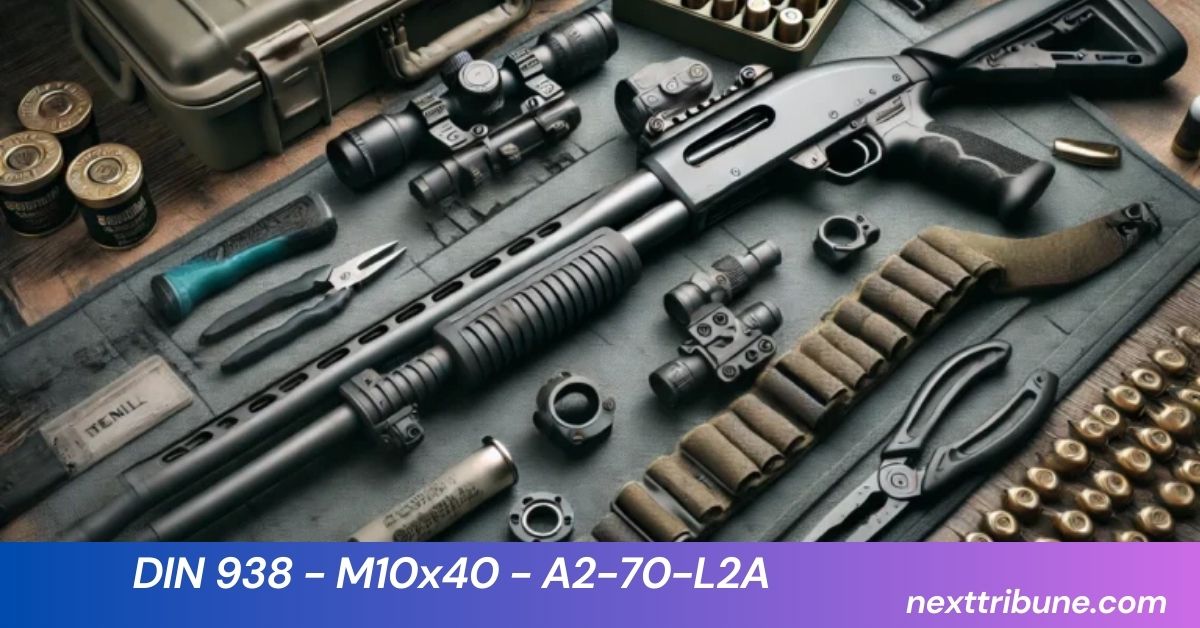
Fasteners are essential components used across industries to secure and connect machinery, construction materials, and other objects. Among them, the DIN 938 – M10x40 – A2-70-L2A double-ended stud is a standout due to its reliability, strength, and versatility. This article aims to provide a comprehensive understanding of DIN 938 – M10x40 – A2-70-L2A, exploring its specifications, advantages, applications, and maintenance, making it an invaluable resource for professionals and DIY enthusiasts alike.
What is DIN 938 – M10x40 – A2-70-L2A?
DIN 938 refers to a German standard that defines the specifications for double-ended studs, which are threaded fasteners designed to engage into two threaded holes. The M10x40 refers to the dimensions and thread specifications of the stud: M10 signifies a 10mm diameter thread, and 40 represents the 40mm length of the stud. The A2-70 denotes the grade of stainless steel used, while L2A specifies the stud’s particular material grade, indicating its corrosion resistance and strength.

Let’s break this down into manageable parts:
1. M10 (Diameter of 10mm)
The “M” in M10 refers to a metric thread. The number 10 indicates the diameter of the stud’s thread, which is 10mm (millimeters). Metric threads are commonly used across Europe and much of the world, offering consistency and ease of use. The 10mm diameter is considered a standard size for a range of applications, making it a versatile choice for fastening and securing machinery and construction elements.
2. 40mm Length
The number 40 refers to the stud’s length, which is 40 millimeters. This length is chosen for its versatility in a wide range of fastening applications. It provides enough room for engagement into threaded components while maintaining a balance between strength and ease of installation.
3. A2 Stainless Steel
A2 stainless steel refers to a specific grade of stainless steel, offering corrosion resistance and longevity. This grade of steel is commonly used in environments that are susceptible to rust and degradation. The A2 classification is recognized for moderate corrosion resistance and is suitable for most general applications.
Also Read: iPartee Events Closed Toronto 2012: A Comprehensive Analysis
4. 70 Grade (Tensile Strength of 700 MPa)
The 70 in A2-70 refers to the strength grade of the stainless steel, which has a tensile strength of 700 megapascals (MPa). Tensile strength is the maximum stress a material can withstand while being stretched before breaking. A tensile strength of 700 MPa is considered strong enough for medium-duty applications where high strength is necessary.
5. L2A (Material Class)
The L2A denotes the specific material class and grade of the stud. This categorization identifies its resistance to specific environmental factors, including factors such as temperature changes, corrosion resistance, and overall durability under stress.
Why is DIN 938 – M10x40 – A2-70-L2A Important?
The DIN 938 – M10x40 – A2-70-L2A stud is indispensable due to its properties that suit a variety of demanding applications. Here’s why this particular fastener is favored across different industries:
1. Durability and Corrosion Resistance
The A2-70 grade stainless steel is specifically designed to be highly resistant to corrosion. Stainless steel, in general, is favored in environments where moisture, chemicals, or exposure to the elements are a concern. The corrosion resistance of A2 stainless steel ensures that the stud remains reliable in harsh conditions, including saltwater exposure in marine environments, industrial pollution, and outdoor weather conditions.
2. Versatility
The size and grade of DIN 938 – M10x40 – A2-70-L2A make it a versatile choice in several industries. Whether you need a stud for a small domestic project, heavy machinery, or large-scale construction work, this stud offers the appropriate balance of strength, durability, and ease of installation.
3. High Tensile Strength
The A2-70 grade offers a tensile strength of 700 MPa, making this stud capable of withstanding substantial loads and stresses without failure. This high tensile strength makes it a preferred choice in applications where components are subjected to dynamic forces, such as in automotive systems, industrial machinery, or structural applications.
Also Read: Search Box Optimization byRankStar: The Ultimate Guide to Better User Experience
4. Standard Compliance
DIN (Deutsches Institut für Normung) standards are well-recognized for their rigorous requirements. Fasteners that adhere to DIN standards, including DIN 938, are held to high-quality benchmarks. Using DIN 938 – M10x40 – A2-70-L2A ensures that you are using a fastener that meets recognized global standards for quality, safety, and reliability.
Applications of DIN 938 – M10x40 – A2-70-L2A
DIN 938 – M10x40 – A2-70-L2A is used in various sectors and industries due to its adaptability. Below are some of the most common applications:
1. Automotive Industry
In the automotive industry, DIN 938 – M10x40 – A2-70-L2A studs are widely used in components like engine blocks, suspension systems, exhaust systems, and structural elements of the vehicle. They ensure that these critical parts stay secure, even under the high stress and vibrations experienced by vehicles.
Why It’s Used:
- Vibration Resistance: Cars and trucks experience constant vibrations. The robust design of this stud ensures that it won’t loosen over time, which is essential for maintaining safety and reliability.
- Corrosion Resistance: Cars are exposed to a variety of harsh elements, from salt on roads in winter to humidity and rain. The corrosion-resistant properties of A2-70 stainless steel make this stud ideal for automotive applications.
2. Construction and Civil Engineering
In the construction industry, DIN 938 – M10x40 – A2-70-L2A is used for securing structural steel, heavy machinery, and in concrete formwork. The high tensile strength and corrosion resistance make it a perfect fit for large construction projects where the fasteners must withstand significant stress and environmental exposure.
Why It’s Used:
- Durability in Harsh Environments: In areas with high humidity or salt exposure, such as coastal regions or industrial sites, DIN 938 – M10x40 – A2-70-L2A provides the corrosion resistance required for long-term performance.
- Load-bearing Capacity: The strength of this stud ensures that it can support the weight of large building materials, providing a reliable and durable fastening solution.
3. Heavy Machinery and Industrial Equipment
For heavy machinery, DIN 938 – M10x40 – A2-70-L2A is used to connect parts of large equipment such as cranes, industrial mixers, conveyors, and excavators. These machines often operate under high stress, and fasteners need to be secure and capable of withstanding high impact.
Why It’s Used:
- Load Handling: Heavy-duty machinery requires studs that can handle heavy load-bearing requirements, making DIN 938 – M10x40 – A2-70-L2A the ideal choice for connecting parts securely.
- Impact Resistance: The stud’s high tensile strength and corrosion resistance make it perfect for environments with heavy impacts, such as construction or mining operations.
4. Marine Applications
The marine environment is harsh on materials, especially when exposed to saltwater. DIN 938 – M10x40 – A2-70-L2A is often used in shipbuilding, docks, and offshore platforms, where components are exposed to saltwater and need to withstand the wear and tear of the ocean.
Also Read: Hunting Dog Killed My7 Turkey Texas: A Heartbreaking Tale and Important Lessons
Why It’s Used:
- Corrosion Resistance: Saltwater exposure can quickly degrade many materials, but A2-70 stainless steel’s resistance to corrosion makes it the perfect material for marine environments.
- Strength in Harsh Conditions: Marine equipment is subject to constant stress, high pressure, and variable temperatures. The durability of this stud ensures it continues to perform in these demanding environments.
Advantages of Using DIN 938 – M10x40 – A2-70-L2A
1. Ease of Installation
The double-ended design of DIN 938 – M10x40 – A2-70-L2A makes installation simpler and faster compared to traditional bolts or nuts. Both ends can be threaded into the corresponding parts, reducing the time spent on assembly and ensuring a secure hold.
2. Cost-Effective Solution
When compared to other fasteners, DIN 938 – M10x40 – A2-70-L2A offers a cost-effective solution, thanks to its durability and long life. Because of its resistance to wear and corrosion, it requires fewer replacements, ultimately reducing maintenance costs.
3. Improved Safety
The high strength of DIN 938 – M10x40 – A2-70-L2A makes it a safe choice for critical applications. It provides a secure connection that reduces the risk of loosening or breaking under stress, which is crucial for safety in automotive, construction, and industrial machinery.
4. Versatility Across Industries
As mentioned earlier, the stud’s size and material make it adaptable to various industries. From automotive to heavy machinery, the DIN 938 – M10x40 – A2-70-L2A can be used in almost any application requiring a secure and durable fastening solution.
How to Choose the Right DIN 938 Fastener
When selecting a double-ended stud like the DIN 938 – M10x40 – A2-70-L2A, there are several factors to consider:
1. Material
The material of the fastener determines its resistance to environmental factors. A2 stainless steel is suitable for most applications, but if your project involves extreme temperatures or exposure to chemicals, you may want to opt for a higher-grade material like A4 or A5.
2. Thread Size
The thread size, such as M10, must match the specifications of the components you’re working with. Ensure that the diameter and length fit the threaded holes in your materials for a secure fit.
3. Application Environment
Consider the conditions where the stud will be used. For outdoor, marine, or high-humidity environments, the corrosion-resistant properties of the A2-70 grade make it an ideal choice.
Maintenance and Care for DIN 938 – M10x40 – A2-70-L2A
To ensure the longevity of DIN 938 – M10x40 – A2-70-L2A, maintenance is key. Here are some steps you can take:
1. Regular Inspection
Perform regular inspections to check for any signs of wear, such as corrosion, rust, or thread damage. Early detection can help you avoid costly repairs or replacements down the road.
2. Cleaning
Keep the stud clean by removing any debris, dirt, or oil that may accumulate over time. Use a non-abrasive cleaner to avoid damaging the corrosion-resistant surface. In marine applications, it is important to regularly wash off saltwater residue to prevent long-term corrosion.
3. Tightening
Ensure that the stud is correctly tightened to the recommended torque specifications. Over-tightening can damage threads, while under-tightening can cause the stud to loosen over time. A torque wrench should be used to apply consistent pressure.
Also Read: LFF22900-CRCE: Features, Benefits, and Applications
Frequently Asked Questions (FAQs)
What does DIN 938 mean?
DIN 938 is a German standard that defines the specifications for double-ended studs, which are used for fastening components at both ends of a stud.
What is the tensile strength of DIN 938 – M10x40 – A2-70-L2A?
The tensile strength of DIN 938 – M10x40 – A2-70-L2A is 700 MPa, making it strong enough for most medium-duty applications.
Where can I use DIN 938 – M10x40 – A2-70-L2A?
You can use DIN 938 – M10x40 – A2-70-L2A in industries like automotive, construction, heavy machinery, and marine applications where strength, durability, and corrosion resistance are required.
Is DIN 938 – M10x40 – A2-70-L2A corrosion-resistant?
Yes, the A2-70 grade stainless steel provides excellent corrosion resistance, making it suitable for harsh environments like marine, industrial, and outdoor applications.
How do I install a DIN 938 – M10x40 – A2-70-L2A stud?
To install, thread both ends of the stud into the corresponding components, ensuring that they fit securely. Use proper tools to tighten the stud to the required torque specifications.
Conclusion
The DIN 938 – M10x40 – A2-70-L2A double-ended stud is an essential fastener known for its durability, versatility, and corrosion resistance. Its applications across industries like automotive, construction, heavy machinery, and marine make it a valuable choice for professionals. By understanding its specifications, advantages, and best practices for maintenance, you can make informed decisions and ensure the longevity and performance of your fastened components.
This versatile fastener will continue to play a vital role in ensuring the safety, functionality, and reliability of a wide range of applications.



